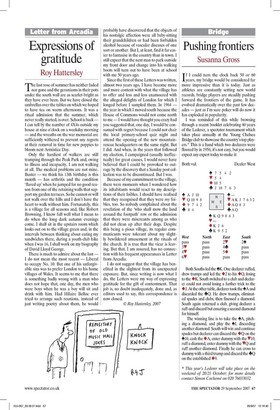Expressions of gratitude
Roy Hattersley The last rose of summer has neither faded nor gone and the geraniums in their pots under the south wall are as scarlet-bright as they have ever been. But we have closed the umbrellas over the tables on which we hoped to have tea on warm afternoons. It was a ritual admission that the summer, which never really started, is over. School is back — I can tell by the number of 4X4s outside my house at nine o'clock on a weekday morning — and the wreaths on the war memorial are sufficiently withered to prevent any regrets at their removal in time for new poppies to bloom next Armistice Day.
Only the hardiest of walkers are still tramping through the Peak Park and, owing to illness and incapacity, I am not walking at all. The medical problems are not mine. Buster — we think his 13th birthday is this month — has arthritis and the condition 'flared up' when he jumped for no good reason from one of the retaining walls that support my garden terraces. So he cannot or will not walk over the hills and I don't have the heart to walk without him Fortunately, this is a village for all seasons and, like Robert Browning, I know full well what I mean to do when the long dark autumn evenings come. I shall sit in the upstairs room which looks out on to the village green and, in the intervals between thinking about eating my sandwiches there, during a youth-club hike when I was 16, I shall work on my biography of David Lloyd George.
There is much to admire about the last — I do not mean the most recent — Liberal to occupy No. 10. But one of his unforgivable sins was to prefer London to his home villages of Wales. It seems to me that there is something badly wrong with a man who does not hope that, one day, the men who were boys when he was a boy will sit and drink with him Had Hilaire Belloc ever tried to arrange such reunions, instead of just writing poetry about them, he would probably have discovered that the objects of his nostalgic affection were all baby-sitting their grandchildren or had been forbidden alcohol because of vascular diseases of one sort or another. But I, at least, find it far easier to fantasise in the country than in town. I still expect that the next man to park outside my front door and change into his walking boots will turn out to have been at school with me 50 years ago.
Since the first of these Letters was written, almost two years ago, I have become more and more content with what the village has to offer and less and less enamoured with the alleged delights of London for which I longed before I sampled them. In 1964 — the year in which I moved south because the House of Commons would not come north to me — I would have thought you crazy had you suggested that, one day, I would be consumed with regret because I could not chair the local primary-school quiz night and attend the opening of the new mountainrescue headquarters on the same night. But I did. And when, in the years that followed my election, I campaigned (usually ineffectually) for great causes, I would never have believed that I could be provoked to outrage by the discovery that a Sunday post collection was to be discontinued. But I was.
Because of my commitment to the village, there were moments when I wondered how its inhabitants would react to my descriptions of their foibles. I should have realised that they recognised that they were my foibles, too. So nobody complained about the revelation of the 'who shall mow the land around the footpath' row or the admission that there were miscreants among us who did not clean up after their dogs. Despite this being a pious village, its regular communicants were tolerant about my slightly bewildered amusement at the rituals of the church. It is true that the vicar is leaving. But that, I am assured, has no connection with his frequent appearances in Letter from Arcadia.
I do not suggest that the village has benefited in the slightest from its unexpected exposure. But, since writing is now what I do, the Letters were my way of expressing gratitude for the gift of contentment. That job is, no doubt inadequately, done and, as editors used to say, this correspondence is now closed.
Roy Hattersley, 2007























































 Previous page
Previous page